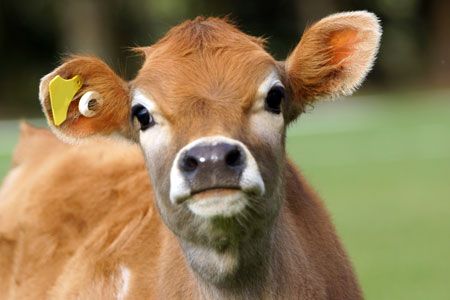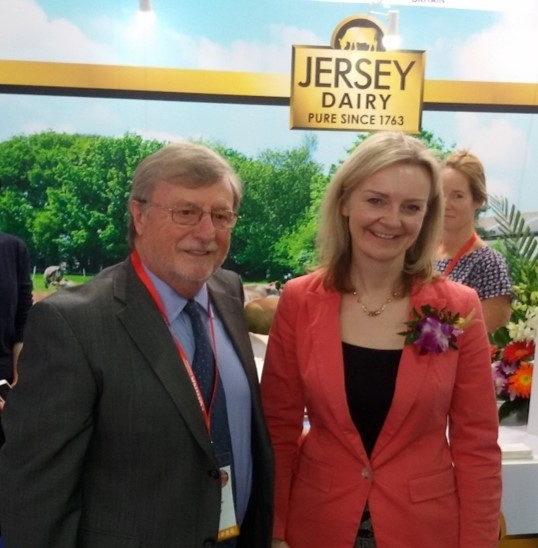

Jersey Dairy says declining herd numbers isn't a sign the industry is in recession.
A recent freedom of information question has revealed the number of dairy cows in the Island has been declining in recent years.
But Jersey Dairy assures Islanders the industry is going from strength to strength as it reaps the benefits of its 'efficiency' strategy.
Mr Le Gallais, Chairman of the Jersey Milk Marketing Board said: “This is all about increased efficiency which is all part of our strategy as the milk marketing board which we devised 10 years ago.”
A freedom of information report published on 29 March, showed the number of cattle 'in milk' on the Island has fallen 7.3% since 2014.
A States of Jersey Agriculture Report from 2015 stated three factors as reasons for the reduction in dairy cattle:
“This reduction in total cattle held on farms in Jersey has been due to a number of factors including:
∙ the decline in the number of dairy farms in Jersey
∙ increasing milk production per cow driven by the import of international genetics in 2008
∙ the milk licencing scheme operated by Jersey Dairy curtailing the output of individual dairy farms in line with market demand”
However, Bob Jones, Head of Marketing and Export at Jersey Dairy addressed each of these points, explaining that a desire to increase efficiency had been the driving force behind the cattle decline.
He said: “The number of dairy farms has declined, a result of consolidation in the industry to maintain farm viability.”

PICTURED: Bob Jones with Liz Truss.
Mr Jones added that it was “not true that Jersey Dairy has curtailed output of individual dairy farms" and said: "Our quota to farmers has increased by 2 million litres, or 18%, between 2011 and 2017.”
Also commenting on the reduction in dairy cattle over recent years, Andrew Le Gallais said: “I think the simplest thing to say is that the word ‘decline’ is inappropriate."
He said: “It be might correct statistically” however, he insisted that the word ‘decline’ did not accurately represent the Jersey Dairy industry which is said to have a “bright future” as they become more efficient and expand into a growing Asian market.
Explaining why a decrease in the number of cows producing milk was actually a good thing for the dairy industry, Mr Le Gallais said: “Yields [per cow] have risen and we are running more efficient farms on the back of this. This means that we are producing more milk per farm, from fewer cows. This is very good news all round.”
According to figures taken from the freedom of information report, in 2014, each cow produced an average of 4754 litres. In 2015 this increased by 4% to 4947 litres per cow.
Whilst yield per cow figures are not yet available for 2016 Mr Le Gallais commented: “I envisage that this coming year there will be an increase in yield per cow, that’s for sure. It’s on a very positive increase trend.”
Jersey Dairy say the increasing yield per cow is due to the importation of bull semen, a change they introduced as part of a plan to increase the efficiency of the industry.
Mr Le Gallais said: “We wanted to import semen so that the efficiency of our Island cow would improve.”
The increasing yield statistics suggest that the dairy’s plans to increase efficiency is working and as Jersey Dairy turn their attention to an expanding Asian market.
Mr Le Gallais believes this increased efficiency of the industry will help as they explore exporting options to Taiwan, South Korea, mainland China and elsewhere- Jersey Dairy have already established a successful link with Hong Kong.
Milk is the drink of choice in Hong Kong! A good start to the week for us in Hong Kong. We are No. 1 for drink sales in the 759 stores. pic.twitter.com/T99sXvHDvl
— Jersey Dairy (@JsyDairy) January 16, 2017
Speaking about the global exportation of Jersey Milk, Mr Le Gallais said: “This is a real ‘fly the flag’ opportunity for the Island initiative as well as being something that promotes and invigorates our own dairy industry.”
His hope for a strong future for Jersey Dairy was mirrored by Mr Jones who added: “We see growth continuing and a bright future for the dairy industry in Jersey.”
Comments
Comments on this story express the views of the commentator only, not Bailiwick Publishing. We are unable to guarantee the accuracy of any of those comments.